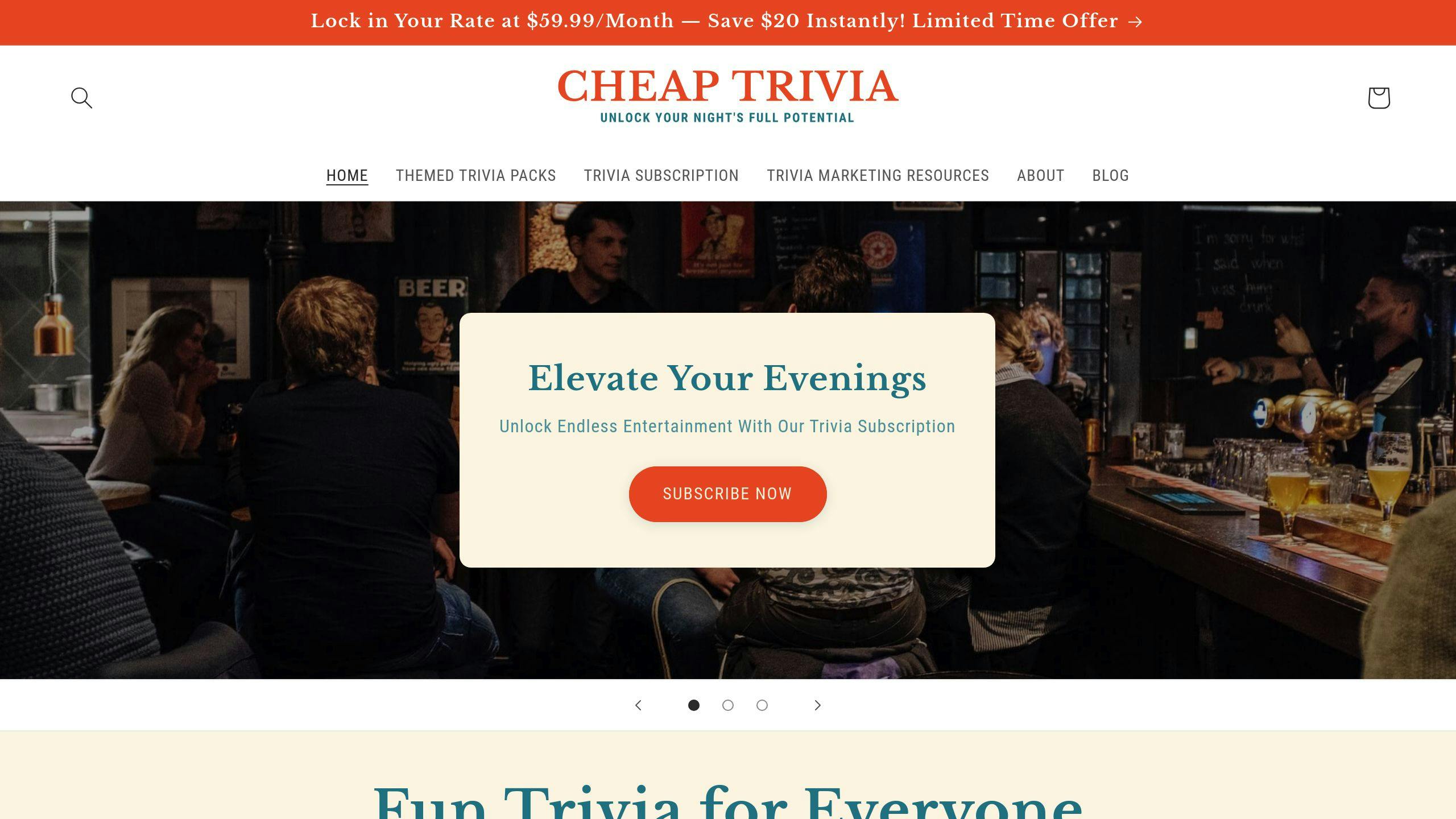Want to host trivia nights that are fun, social, and keep people coming back? Here’s how to make your events team-focused and successful:
- Set Clear Team Rules: Limit teams to 4-6 players for balanced participation. Ban phones, set time limits, and explain scoring upfront.
- Use Diverse Questions: Mix topics like history, pop culture, and local trivia to involve everyone.
- Add Themes and Interactive Rounds: Use multimedia (pictures, audio) and themed nights to boost engagement.
- Offer Prizes: Combine short-term rewards (gift cards) with long-term incentives (loyalty points, trophies) to encourage regular attendance.
- Promote Effectively: Use social media, posters, and staff invites to spread the word.
- Stick to a Schedule: Host weekly trivia on quieter evenings (e.g., Tuesdays) to build a loyal crowd.
Professional trivia services like Cheap Trivia can provide ready-made question packs and promotional tools, saving you time while ensuring high-quality events.
7 Steps to Setting Up a Kickass Trivia Night in Your Bar
Creating a Team-Focused Trivia Night
Planning a trivia night that encourages teamwork and keeps everyone engaged takes some effort, but it’s worth it. Here’s how you can organize a fun and collaborative event.
Setting Team Rules
Keep teams small - ideally 5 to 7 players. This size strikes a good balance: it avoids overcrowding, allows for a mix of skills, and ensures everyone has a chance to participate. Lay out the rules clearly before the event to avoid confusion or disputes. Key points to cover include:
- Phone use: Are phones allowed or banned during gameplay?
- Answer submission: How will teams submit answers - verbally, on paper, or digitally?
- Time limits: Set clear limits for answering questions.
- Scoring: Explain how points will be awarded to avoid arguments.
- Team registration: Outline how teams will sign up and any restrictions on team size.
Once these rules are set, you can focus on creating trivia that keeps all players engaged.
Using Diverse Question Categories
A good trivia night includes a mix of categories to appeal to everyone’s strengths. This ensures all team members can contribute. Here’s a breakdown of potential question types:
| Category Type | Purpose | Example Topics |
|---|---|---|
| Knowledge-Based | Tests factual recall | History, Science, Geography |
| Pop Culture | Appeals to a wide audience | Movies, TV Shows, Music |
| Visual Elements | Adds variety and creativity | Picture Rounds, Logo Quizzes |
| Local Interest | Builds a sense of connection | Local History, Landmarks |
This mix keeps the game exciting and inclusive for everyone.
Adding Interactive and Themed Elements
To take your trivia night up a notch, introduce interactive or themed elements. These additions not only make the event more engaging but also encourage teams to work together. For example:
- Interactive rounds: Use multimedia like pictures, audio clips, or videos to create rounds that feel fresh and dynamic. Bonus rounds can also add an extra layer of fun.
- Themes: A theme can tie the event together. For a holiday trivia night, you might include seasonal decorations, themed drinks, or questions related to the holiday.
If creating everything from scratch feels overwhelming, services like Cheap Trivia offer pre-made themed packs with multimedia options. These can save you time while ensuring your trivia night is both entertaining and well-organized.
Encouraging Team Formation and Regular Attendance
Building a strong trivia community takes thoughtful planning and consistent effort. Here’s how you can keep teams returning week after week.
Using Incentives and Prizes
A good reward system can motivate teams to show up regularly. Design your prizes to balance competition and teamwork:
| Prize Type | Purpose | Example |
|---|---|---|
| Short-term Rewards | Immediate motivation | Gift cards, drink vouchers |
| Long-term Rewards | Encourage team loyalty | Monthly trophies, venue credit |
| Loyalty Rewards | Reward regular attendance | Point system for frequent visits |
| Special Events | Celebrate milestones | Seasonal prizes |
Mix up the prizes to keep things fresh and encourage a sense of camaraderie among participants.
Once your reward system is ready, make sure your event gets the visibility it needs.
Promoting Events Effectively
Getting the word out is key. Use multiple channels to ensure maximum reach:
Online Promotion
- Post teasers, photos, and winner updates on social media.
- Create Facebook events for themed trivia nights.
- Send reminder emails to your mailing list.
In-Venue Promotion
- Put up posters and table tents to advertise upcoming trivia nights.
- Train your staff to invite regular customers personally.
- Announce winners on venue signage to spark interest.
Promotion works best when combined with a predictable schedule that your audience can rely on.
Scheduling Consistent Trivia Nights
A consistent schedule helps build a loyal trivia crowd. Many venues find success hosting trivia on weekday evenings, typically Tuesday through Thursday, when there’s less competition from other events.
Tips for Scheduling:
- Stick to the same day and time each week.
- Avoid clashing with major events and tie themes to holidays when possible.
- Share schedules a month in advance to give patrons time to plan.
- Use regular events to create a dependable trivia community.
Services like Cheap Trivia can supply fresh content for your events, helping you keep trivia nights engaging while building a strong sense of community among participants.
sbb-itb-46dff1a
Using Services Like Cheap Trivia for Easier Hosting

Using professional trivia services can make organizing and hosting team trivia nights much simpler and more enjoyable.
Accessing Pre-Made Trivia Packs
Pre-made trivia packs come in formats like PDFs and PowerPoint slides, making it easy to host polished, engaging events. These packs often include professional presentations, team answer sheets, and updates every week.
| Format | Benefits | Best Used For |
|---|---|---|
| PDF Handouts | Simple to print and share | Team answer sheets, scoring guides |
| PowerPoint Slides | Sleek, professional displays | Showing questions, picture rounds |
| Picture Rounds | Adds a visual element | Encouraging team discussions |
Once you have these materials, tweaking them to fit your audience can make the experience even better.
Choosing Themes and Customizing Content
Picking the right themes is key to keeping your trivia nights appealing. Think about your venue's vibe and the interests of your regulars. For instance, a sports bar might mix general trivia with sports-themed nights to attract a variety of players while keeping loyal patrons engaged.
Tips for Theme Selection:
- Align themes with your venue's style and audience.
- Rotate categories to keep things fresh and encourage new teams to join.
- Include questions with varying levels of difficulty to make it fun for everyone.
These small adjustments can make a big difference in how much your audience enjoys the event.
Getting Marketing and Hosting Help
Many trivia services also provide tools to help you promote and manage your events. These include ready-to-use social media templates, posters, and email content, making it easier to spread the word. By using these resources, you can create a welcoming, team-friendly environment that keeps people coming back.
With a structured approach, professional trivia services allow venues to deliver high-quality events while focusing on building a loyal trivia community.
Conclusion: Making Trivia Nights a Community Event
By using team-focused strategies and tapping into professional resources, venues can create a space where competition and connection thrive.
The success of team trivia rests on three key elements: organization, engagement, and community. Well-planned events with clear team guidelines and a mix of question categories allow everyone to participate. This approach helps build relationships among players and creates a welcoming vibe that keeps teams coming back.
Professional trivia services have made hosting easier than ever. With pre-made materials and expert guidance, hosts can focus on delivering memorable experiences. Themed trivia packs add variety and ensure high-quality content, keeping players interested over time.
To strengthen the community aspect of trivia nights, try these proven tactics:
| Element | Implementation | Community Impact |
|---|---|---|
| Regular Scheduling | Host weekly events | Builds routine and loyalty |
| Theme Rotation | Alternate between general and niche themes | Appeals to a wide range of players |
| Team Incentives | Offer prizes and recognition | Encourages repeat participation |
| Interactive Elements | Add multimedia or picture rounds | Boosts team collaboration |
Striking the right balance between difficulty, variety, and competition is key to long-term success. Venues that adopt these strategies often see not only higher attendance but also stronger connections forming among regular participants.
A thriving trivia scene can boost your venue’s reputation as a social hub. Focusing on consistency and understanding your audience turns trivia nights into much more than just an event - it makes them a cornerstone of your local community.
With these steps in place, you’ll be ready to host trivia nights that entertain and bring people together. Up next, we’ll tackle common questions to help fine-tune your events even further.
FAQs
How big can a trivia team be?
For bar trivia, the sweet spot for team size is usually 4-6 players. This range offers a good mix of diverse knowledge and smooth teamwork [1]. For example, at venues like Trinity Pub, teams are often capped at 5 members to keep the competition fair and manageable [2].
| Team Size | Benefits | Challenges |
|---|---|---|
| 4-6 Players | Balanced input, easy teamwork | None - ideal for most setups |
| Fewer than 4 | Faster decisions, simpler to manage | Limited knowledge pool |
| More than 6 | Broader knowledge base | Harder to manage, less focus |
To make trivia nights run smoothly, venues can:
- Clearly define and communicate maximum team sizes.
- Adjust scoring systems to give smaller teams a fair chance.
- Offer flexibility for special events or themed nights.
Choosing the right team size policy not only enhances the trivia experience but also helps create a welcoming and social atmosphere. This encourages players to return regularly, building stronger connections and fostering team loyalty. Combined with consistent scheduling and fair rules, setting the right team size becomes a key factor in hosting successful trivia nights.
